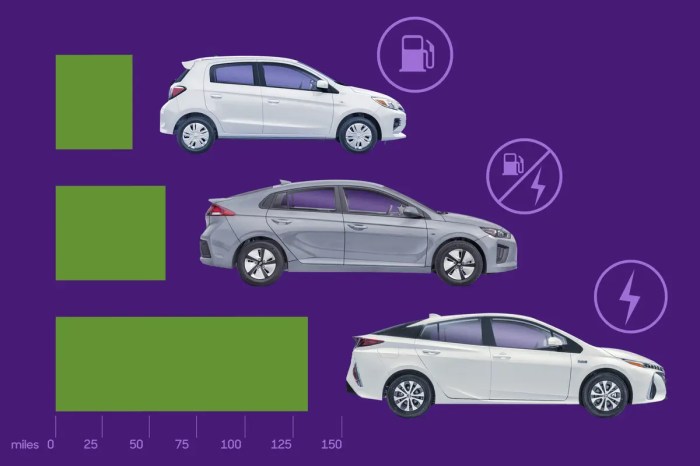Best fuel-efficient cars are quickly becoming essential in today’s automotive landscape, appealing to eco-conscious drivers and budget-savvy consumers alike. As fuel prices fluctuate and environmental concerns grow, understanding what makes a car fuel-efficient is more important than ever. These vehicles not only reduce our carbon footprint but also help save money in the long run, making them a smart choice for many.
Fuel-efficient cars come in various forms, from hybrids to fully electric models, each offering unique benefits and considerations. This overview will delve into the types of fuel-efficient vehicles, highlight the best options for 2023, and provide insights on how consumers can make informed decisions when purchasing their next ride.
Overview of Fuel-Efficient Cars
In recent years, the automotive industry has seen a significant shift towards fuel-efficient vehicles, reflecting changing consumer preferences and environmental concerns. Fuel-efficient cars are defined by their ability to travel longer distances on less fuel, thus lowering the overall consumption of gasoline or diesel. This trend is increasingly vital in today’s automotive market where rising fuel prices and ecological awareness push consumers to seek options that not only save money but also reduce their carbon footprints.
Fuel efficiency plays a crucial role in reducing greenhouse gas emissions, which are a primary driver of climate change. It not only benefits the environment by decreasing pollution but also bolsters the economy by lowering the dependency on fossil fuels. With the increasing cost of fuel, consumers are keenly aware of how fuel-efficient vehicles can impact their budgets, making these cars not only a practical choice but also a responsible one.
Types of Fuel-Efficient Vehicles

Fuel-efficient vehicles come in various types, each offering distinct advantages and disadvantages. Understanding these categories helps consumers make informed decisions based on their needs.
- Hybrid Vehicles: These cars combine a gasoline engine with an electric motor to enhance fuel efficiency. They are designed to switch between the two power sources, optimizing performance and economy.
- Electric Vehicles (EVs): Fully electric cars run on electricity alone, producing zero tailpipe emissions. They are known for their high efficiency, but charging infrastructure and range can be concerns for some consumers.
- Diesel Vehicles: Diesel engines tend to provide better fuel economy compared to gasoline engines, especially on highways. However, they can emit higher levels of certain pollutants, which may raise environmental concerns.
Understanding the differences in fuel efficiency among these categories is essential. For instance, hybrids generally offer better mileage in urban settings, while diesel vehicles excel on long road trips due to their efficiency on highways. Each vehicle type has its own set of benefits and drawbacks, from initial purchase costs to maintenance and environmental impact.
Top Fuel-Efficient Cars of 2023
As we navigate through 2023, several fuel-efficient cars have emerged as top contenders in the market. Here’s a detailed list of these vehicles along with their specifications, including fuel economy ratings that highlight their efficiency.
| Car Model | Fuel Economy (mpg) | Engine Type |
|---|---|---|
| Toyota Prius | 58 city / 53 highway | Hybrid |
| Tesla Model 3 | 148 city / 132 highway (MPGe) | Electric |
| Honda Insight | 55 city / 49 highway | Hybrid |
| Hyundai Ioniq 5 | 132 city / 110 highway (MPGe) | Electric |
| Ford Maverick (Hybrid) | 42 city / 33 highway | Hybrid |
These cars stand out due to their advanced technologies, which include regenerative braking systems, lightweight designs, and alternative fuel sources. Each of these features contributes significantly to their exceptional fuel economy and environmental friendliness.
Factors Influencing Fuel Efficiency
Several key factors influence a vehicle’s fuel efficiency, and understanding them can help consumers make better choices. These factors include driving habits, maintenance practices, and advancements in technology.
- Driving Habits: Aggressive driving, rapid acceleration, and excessive idling can decrease fuel efficiency significantly. Smooth, steady driving can lead to better mileage.
- Vehicle Maintenance: Regular maintenance such as oil changes, tire rotations, and air filter replacements ensures that the vehicle operates optimally, enhancing fuel economy.
- Technology: Modern vehicles often come equipped with advanced technologies like adaptive cruise control and fuel injection systems, which improve efficiency.
For consumers looking to maximize fuel efficiency in their vehicles, adopting better driving habits and keeping up with maintenance schedules are essential steps.
Cost-Benefit Analysis of Fuel-Efficient Cars
Owning a fuel-efficient car offers several cost savings over time, making them an attractive option for budget-conscious consumers. Here’s a breakdown of the financial advantages associated with these vehicles.
- Lower fuel costs due to enhanced fuel economy.
- Potentially reduced maintenance costs, especially for hybrids and electric vehicles, which have fewer moving parts.
- Government incentives and tax credits for purchasing hybrid or electric vehicles, making the initial investment more palatable.
Understanding the initial purchase price compared to long-term fuel savings is crucial. While fuel-efficient cars may have a higher upfront cost, the savings on fuel can lead to significant financial benefits over the vehicle’s lifespan.
Future Trends in Fuel Efficiency

As technology continues to evolve, several emerging trends are expected to shape the future of fuel efficiency. Electric vehicle advancements are at the forefront, with improved battery technologies enhancing range and reducing charging times.
Additionally, policy changes are likely to play a significant role in promoting fuel-efficient vehicles. Governments worldwide are implementing stricter emissions regulations and encouraging the transition to cleaner energy sources. These factors will drive innovation and growth in the fuel-efficient vehicle sector.
Consumer Considerations, Best fuel-efficient cars

When considering the purchase of a fuel-efficient car, consumers should evaluate several key factors to make an informed decision. Here’s a checklist of features and specifications to consider:
- Fuel economy ratings and real-world performance.
- Initial purchase price vs. potential savings on fuel.
- Availability of incentives for hybrid or electric models.
- Driving range and charging infrastructure for electric vehicles.
- Overall reliability and maintenance requirements.
Test driving different models and considering personal preferences is crucial in the decision-making process. Each individual’s driving needs and lifestyle will ultimately determine the best fuel-efficient vehicle for them.
Concluding Remarks: Best Fuel-efficient Cars
In summary, exploring the best fuel-efficient cars reveals a landscape filled with choices that cater to both environmental and financial motivations. By considering factors like vehicle type, maintenance, and driving habits, consumers can maximize their fuel efficiency while enjoying the latest advancements in automotive technology. As the market evolves, staying informed about trends and incentives will ensure that drivers can make the most of their investment in a fuel-efficient vehicle.